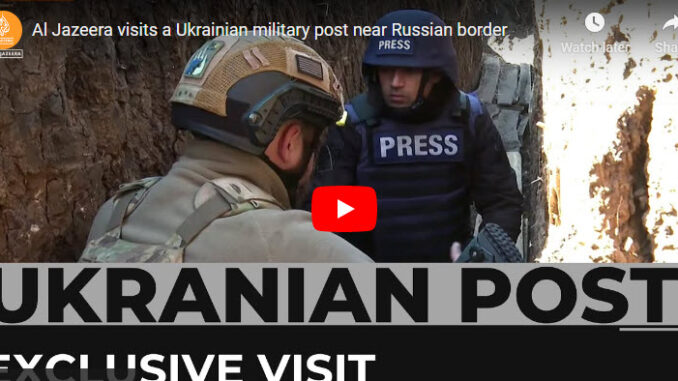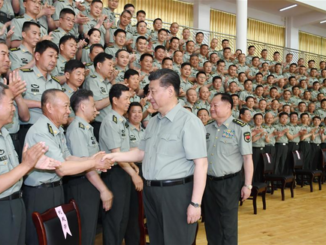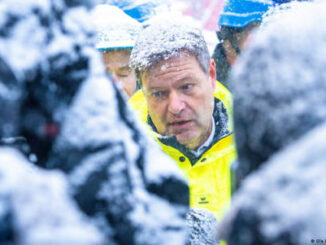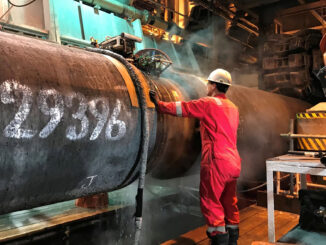
Russia has accused Ukraine of planning to detonate a radioactive dirty bomb and blame it on Moscow.
Defence Minister Sergey Shoigu discussed the “rapidly deteriorating situation” in the Ukraine war in calls with NATO nations on Sunday.
Without providing evidence, Shoigu said Ukraine could escalate the conflict with a dirty bomb – a device that uses explosives to scatter radioactive waste. It does not have the devastating effect of a nuclear explosion, but it could expose broad areas to radioactive contamination.
“The purpose of the provocation is to accuse Russia of using weapons of mass destruction in the Ukrainian theatre of operations and thereby launch a powerful anti-Russian campaign in the world aimed at undermining confidence in Moscow,” the RIA Novosti news agency said on Telegram.
“The calculation of the organisers of the provocation is that if it is successfully implemented, most countries will react extremely harshly to the ‘nuclear incident’ in Ukraine,” the post said. “As a result, Moscow will lose the support of many of its key partners.”
Russia provided no evidence to substantiate its allegation.
Officials in Kyiv immediately hit back.
“If anyone can use nuclear weapons in this part of Europe – it can be only one source – and that source is the one that has ordered comrade Shoigu to telephone here or there,” Ukrainian President Volodymyr Zelenskyy said in his nightly video message.
Foreign Minister Dmytro Kuleba said “Russian lies” about a dirty bomb “are as absurd as they are dangerous”.
“Firstly, Ukraine is a committed NPT [nuclear Non-Proliferation Treaty] member: We neither have any ‘dirty bombs’ nor plan to acquire any,” he said. “Secondly, Russians often accuse others of what they plan themselves.”
‘Uncontrolled escalation’
Whatever the likelihood of a dirty bomb attack, the back-and-forth accusations hold their own dangers.
“It appears that there is a shared feeling that the tensions have approached the level that could raise the real threat for all,” Fyodor Lukyanov, the Kremlin-connected head of the Council for Foreign and Defense Policy, a Moscow-based group of top foreign affairs analysts, said in a commentary on Shoigu’s phone conversations.
Previous Russian assertions that Ukraine might resort to using banned weapons such as biological arms have stirred concerns in the West that Moscow might be preparing to stage false-flag attacks, which they would blame on Kyiv.
Shoigu spoke with US defence chief Lloyd Austin on Sunday for the second time in three days and held a flurry of calls with Lloyd’s counterparts in three other NATO countries.
Moscow provided no details on the conversation with Austin, which came after the two men spoke on Friday for the first time since May. Shoigu said the situation in Ukraine was substantially worsening in the other calls.
“They discussed the situation in Ukraine, which is rapidly deteriorating,” the Russian defence ministry said of Shoigu’s call with French Defence Minister Sebastien Lecornu. “It is trending towards further uncontrolled escalation.”
Austin told Shoigu he “rejected any pretext for Russian escalation” in Ukraine, the Pentagon said.
‘Pretext for escalation’
Shoigu spoke separately to Turkish Defence Minister Hulusi Akar and the UK’s Ben Wallace.
Britain’s defence ministry said Wallace “refuted” claims that Western countries sought to help Ukraine escalate the conflict and “cautioned that such allegations should not be used as a pretext for greater escalation”.
There was no indication from the Russian side that the conversations had produced any positive result. They showed, however, that Russia and members of the NATO alliance are maintaining channels of communication at a time of rising international concern about a possible nuclear escalation.
With Russia reeling from successive defeats in Ukraine, President Vladimir Putin has said Moscow would use “any means necessary” to defend its “territorial integrity”.
US President Joe Biden has warned that the world is closer to “armageddon” than at any time since the 1962 Cuban Missile Crisis.
Last week, NATO launched its annual nuclear deterrence drills and said it expects Russia to hold drills shortly to test the readiness of its own nuclear forces.
French President Emmanuel Macron said on Sunday he believed there was a chance for peace in Ukraine, even as Russia warned the conflict could escalate.
“There is the prospect for peace, it will come around at some moment,” said Macron at a conference in Rome.
“And at a particular moment, given how things are evolving, and when the Ukrainian people and its leaders will have decided on the terms of this, a peace deal can be built up with the other side.”



